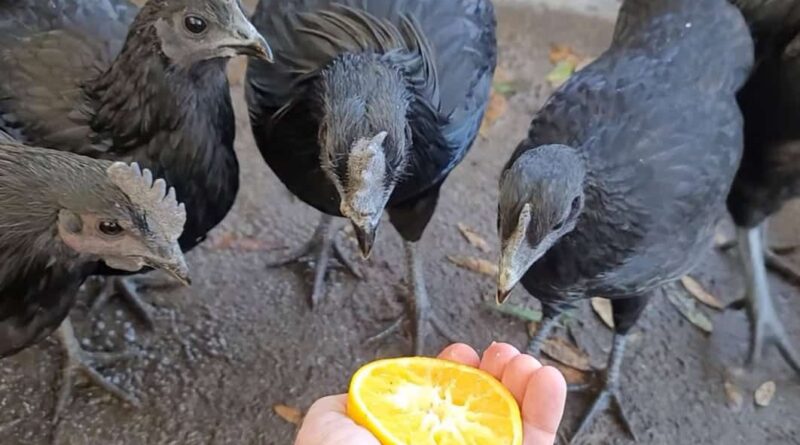Can Chickens Eat Oranges? A Complete Guide to Feeding Citrus to Your Flock
Chickens are fascinating creatures that bring joy and utility to countless backyards around the world. As a chicken owner, you likely want to provide your flock with a diverse and nutritious diet to ensure their health and happiness. While grains, vegetables, and commercial feed make up the bulk of their diet, many chicken keepers wonder about the safety of feeding them less conventional treats, such as oranges. In this guide, we’ll dive deep into the topic of feeding citrus to chickens, with a particular focus on oranges, their nutritional value, potential benefits, and risks. By the end, you’ll have a clear understanding of whether oranges should become a staple in your flock’s diet or remain an occasional treat.
Understanding a Chicken’s Diet
Chickens are omnivorous creatures that thrive on a varied diet. In the wild, they forage for insects, seeds, berries, and plants, balancing their nutritional intake instinctively. Domesticated chickens require a similar variety to stay healthy, which is why a balanced diet of commercial feed supplemented with fresh produce is ideal.
While chickens can eat a wide range of foods, not everything is safe or suitable for them. Certain foods can upset their digestive systems or even pose toxic risks. Understanding the nutritional requirements of chickens is the first step in determining whether specific foods, such as oranges, are a good fit for your flock.
Nutritional Profile of Oranges
Oranges are a popular citrus fruit known for their refreshing flavor and high vitamin C content.
Here’s a breakdown of their nutritional profile per 100 grams:
- Calories: 47
- Carbohydrates: 11.8 g
- Fiber: 2.4 g
- Sugar: 9.4 g
- Vitamin C: 53.2 mg (89% of the recommended daily intake for humans)
- Potassium: 181 mg
- Calcium: 40 mg
- Magnesium: 10 mg
These nutrients make oranges a healthy snack for humans, but do they hold the same benefits for chickens?
Can Chickens Eat Oranges?
The short answer is yes, chickens can eat oranges, but there are important considerations to keep in mind. While oranges are not toxic to chickens, their high acidity and sugar content can cause issues if consumed in large quantities. Chickens have different digestive systems from humans, and while they can handle a wide range of foods, citrus fruits like oranges should be offered with caution.
Benefits of Feeding Oranges to Chickens
Despite some concerns, oranges can offer a few benefits to chickens when provided in moderation:
1. Rich Source of Vitamin C
Vitamin C plays a role in supporting the immune system, which can be particularly beneficial for chickens during stressful periods, such as molting or extreme weather conditions.
2. Hydration
Oranges have a high water content, making them a refreshing treat on hot days. Offering slices of orange can help keep your flock hydrated while giving them a tasty snack.
3. Antioxidants
The antioxidants found in oranges can help combat oxidative stress in chickens, promoting overall health and longevity.
4. Enrichment
Oranges can serve as a form of enrichment for chickens. Pecking at orange slices engages their natural foraging instincts and keeps them entertained.
Risks of Feeding Oranges to Chickens
While there are benefits, it’s important to understand the potential risks associated with feeding oranges to your flock:
1. High Acidity
The high acidity of oranges can upset a chicken’s digestive system. Over time, excessive consumption of acidic foods may lead to issues such as decreased calcium absorption, which is crucial for laying hens.
2. Sugar Content
Oranges are relatively high in sugar, which can lead to weight gain and other health issues if fed in large amounts. Chickens don’t need sugary foods as a regular part of their diet.
3. Picky Eating Habits
Offering too many treats, including oranges, can make chickens picky eaters. They might start to ignore their staple feed, which is formulated to provide complete nutrition.
4. Mold Risk
If oranges are left in the coop or run for too long, they can attract mold and pests. Moldy food is dangerous for chickens and should always be avoided.
How to Feed Oranges to Chickens
If you decide to offer oranges to your chickens, it’s important to do so correctly to minimize risks and maximize benefits:
1. Wash the Fruit
Always wash oranges thoroughly to remove any pesticides or chemicals that might be on the skin.
2. Slice into Manageable Pieces
Cut the oranges into small, easy-to-peck pieces. Avoid giving them whole fruits, as this can be challenging for chickens to eat.
3. Remove the Seeds
While orange seeds are not toxic, it’s a good idea to remove them to prevent any choking hazards.
4. Offer in Moderation
Provide oranges as an occasional treat, not a staple. A good rule of thumb is to ensure treats make up no more than 10% of a chicken’s diet.
5. Monitor Your Flock
Observe your chickens after feeding them oranges for the first time. Some chickens might not enjoy the taste, while others could show signs of digestive upset.
Alternatives to Oranges for Chickens
If you’re hesitant about feeding oranges to your flock, there are plenty of other fruits and vegetables that chickens can enjoy safely:
- Apples (remove seeds)
- Berries (strawberries, blueberries, raspberries)
- Watermelon (great for hydration)
- Cucumbers
- Carrots (shredded or cooked)
- Leafy Greens (kale, spinach)
These options provide variety and nutrition without the high acidity of oranges.
Frequently Asked Questions
1. Can Baby Chicks Eat Oranges?
Baby chicks have sensitive digestive systems and should not be given oranges. Stick to starter feed designed for their nutritional needs and introduce treats like fruits and vegetables only after they are a few weeks old.
2. Can Chickens Eat Orange Peels?
Orange peels are not toxic to chickens, but they are tough and difficult to digest. Most chickens will not eat the peels, so it’s best to avoid offering them.
3. How Often Can I Feed Oranges to My Chickens?
Oranges should be offered no more than once or twice a week, and in small quantities. Always prioritize a balanced diet over treats.
4. What Other Citrus Fruits Can Chickens Eat?
Similar to oranges, chickens can eat other citrus fruits like lemons, limes, and grapefruits in moderation. However, the same caution regarding acidity and sugar applies.
Conclusion: Are Oranges Good for Chickens?
Oranges can be a fun and nutritious treat for your chickens when offered sparingly and with care. They provide hydration, vitamin C, and antioxidants, making them a valuable addition to your flock’s diet during certain times. However, their high acidity and sugar content mean they should never replace the primary feed or make up a significant portion of your chickens’ diet.
By understanding the benefits and risks, you can confidently decide how to incorporate oranges into your chickens’ feeding routine. Remember, moderation is key, and observing your flock’s health and behavior will always guide you in making the best decisions for their well-being




